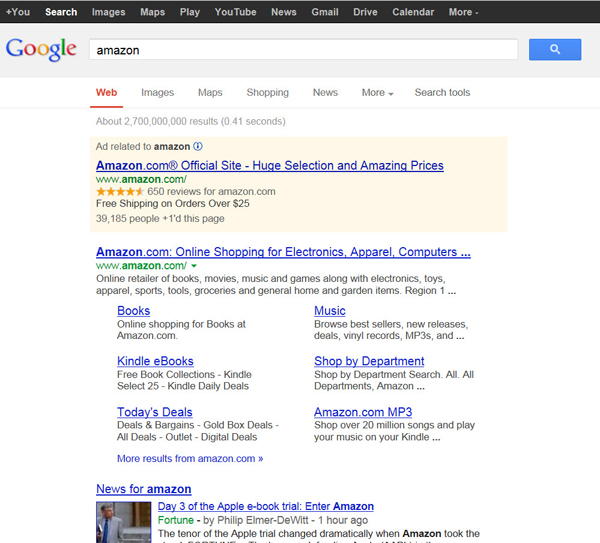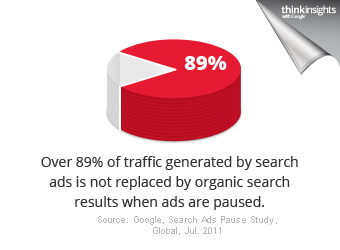Over the years, I’ve been asked loads of questions on pay-per-click advertising. One of the vital common from new advertisers is, “Why should I bid on my brand name? I already happen first in Google for my brand, so I don’t think I must have to pay for traffic.”
On the skin, this can be a reasonable question. Nobody likes deciding to buy something they could get totally free. But PPC isn’t that easy. Bidding in your brand name in PPC is imperative for quite a lot of reasons.
Dominate the quest Engine Results Page
The top of the hunt engine results page is key real estate. Many of the clicks happen on this space. By having a presence in both PPC and organic results, what you are promoting can push other listings down the page, increasing the probabilities that the clicks will visit your site and never elsewhere.
Take a glance at this SERP for Amazon.

Search engine results page for “amazon.”
Of the whole listings above the fold, all but one is for Amazon. Amazon is a hugely sophisticated marketing organization. If bidding by itself brand wasn’t working, it wouldn’t do it.
Lock Out the Competition
If you don’t bid by yourself brand, i will nearly make sure that your competitors will. “Conquesting” is a standard tactic in PPC. Savvy advertisers use techniques like rock-bottom pricing and large discounts of their PPC ad copy to lure potential customers clear of their competition.
Don’t let this happen to you. Whilst you can’t prevent competitors from bidding in your brand, you are able to combat their efforts by ensuring you’re present at the page.
Cost Is Nominal
The cost per click your brand terms is way less than on non-brand terms. It is because companies nearly always get a prime quality score — see this explanation from Google — all alone brands. In spite of everything, not anyone is more relevant for those searches than you.
The clients I manage see CPCs for brand terms which are 80 percent under CPCs for non-branded terms. Why not make the most of this low-cost, highly-qualified traffic?
Traffic Converts at a High Rate
When someone searches for your brand, they know they’re looking for you. Chances are they’re past the early research stage and are not only ready to buy, they’re ready to buy from you. Make it easy for them by bidding on your brand terms.
Branded PPC keywords convert at a much higher rate than non-branded terms. When you combine high conversion rates with lower CPCs, you get a high volume of conversions at a very affordable. There is no reason not to capture these inexpensive conversions by bidding on your brand terms.
Brand Bidding Boosts your Quality Score
Quality score is the search engines’ measure of relevance. I addressed it here previously, in “PPC Basics, Part 7. Quality Score.” The higher the quality score, the more relevant are your keywords and ad copy. If you’ve earned a high quality score, you’ll pay less per click than competitors with a lower quality score, even if you rank higher than they do.
Branded terms almost always earn a very high quality score, usually 10 out of 10. Not only does this result in low CPCs, it helps to boost your average account quality score. In fact, some PPC advertisers I know launch a brand-only campaign for new products, for the sole purpose of earning a high account quality score. After a few weeks, they begin launching non-branded keywords.
While I’m not advocating that approach, earning a high quality score early on is important and bidding on your brand is a good way to accomplish this goal.
Control your Message with PPC
In PPC, you have total control over ad copy. You decide what you want to say in your ads. Not only that, but you can test different messages to determine what converts the best.
Organic listings, on the other hand, offer little control. You can optimize your title tag and meta description, but you’re still at the mercy of the search engines. The search engines, not you, decide what snippets to show.
In PPC, not only do you control your ad copy, but also your sitelink copy. Smart advertisers use sitelinks to extend their ad copy and link to deep pages of their website. Organic listings may also include sitelinks — see the Amazon example above — but again, the search engines decide what goes in the organic sitelinks.
There is no guarantee that sitelinks will display for either organic or paid listings, but why let Google or Bing choose your copy? Use PPC and choose it on yourself.
Boost your Traffic by 89 Percent
Eighty-nine percent sounds like a lofty claim. Yet, it’s backed up by data.
In 2011, Google conducted a study on how the number of organic clicks changes when PPC ads are present. The study found that 89 percent of clicks on paid ads were incremental. In other words, traffic from PPC was not replaced by organic traffic when search ads were paused.

In 2011, 89 percent of clicks on paid ads were incremental, according to a study by Google.
Think about that. Traffic from PPC isn’t replaced by organic traffic, so when you don’t bid on your brand, you’re sacrificing a large number of visitors. And as mentioned earlier, your competitors are probably stealing them instead.
You might be thinking, “That study was done by Google, so it’s probably biased.” That’s a fair thought. However, I’ve experienced this with clients time and again when they pause PPC for whatever reason. Traffic and conversions from organic traffic, and from all traffic sources for that matter, do not replace PPC. Instead, these clients universally saw sales decline when PPC was paused.
In short, bidding on your brand is not just a great idea, it’s an absolute must in my view. Brand bidding is an inexpensive thanks to generate conversions on your brand.